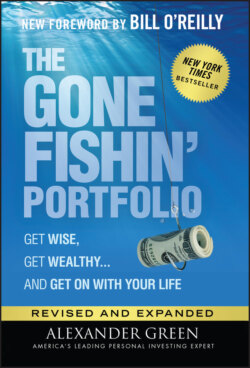Читать книгу The Gone Fishin' Portfolio - Alexander Henry Green - Страница 18
На сайте Литреса книга снята с продажи.
SOMETIMES LESS IS MORE
ОглавлениеIn The Millionaire Next Door, Thomas Stanley and William Danko reported that most Americans with a net worth of a million dollars or more follow a remarkably similar path. They maximize their earned income, minimize their expenses, live beneath their means and religiously save the difference. It may sound pedestrian, but do this long enough and one day you just may wake up with a seven-figure net worth.
It means making sacrifices, however. As we go through life, we quickly learn that expenses seem to rise to meet the income available. In our wonderful capitalistic society, there is never a shortage of fabulous products and services vying for our attention.
However, it is possible to say no.
Several years ago, I was invited to do a segment about saving and investing on Fox TV in Tampa, Florida. Near the end, the interviewer suddenly popped this question: “What do you say to those viewers out there who say they just can't save anything?”
As it happened, I had just returned from a two-week investment expedition to China. During my trip, I had visited with many laborers who made less than $150 a month. Yet the average Chinese worker—acutely aware that the government provides no social safety net—saves over 47% of his income. (I'm not suggesting for a moment that an American could live on anything close to this. But it was a powerful lesson in fiscal discipline nonetheless.)
“Too many Americans don't save anything,” I reminded the moderator, half-jokingly, “because they're spending money they don't have on things they don't need to impress people they don't like.” Judging by the look on his face, that wasn't the answer he was expecting.
Look, I realize that when you're young and starting out in life, saving may not be a priority. When you get older and you have kids (and perhaps elderly parents) to support, saving can be tough, too.
But most of us could get by—by hook or by crook—on at least 10% less than what we're living on today. If we pay ourselves that 10% (or more) first, it will make a world of difference 10, 20 or 30 years down the road.
Of course, it's not hard times that keep most Americans from saving what they should. It's a lack of discipline, something at which I used to excel.
As a young man in my 20s, I worked as a stockbroker in a local firm. I soon began earning a six-figure income. Not long after, I bought a spanking-new lakefront house, got the ski boat, the Jaguar XJ6 and all the other toys. I saved virtually nothing.
When my friends came over for parties—which were frequent—most of them assumed I was rich. I was nothing of the sort. Wealth is not the same thing as income. If you earn a lot of money and blow it every year, you're not rich. You're just living high. Wealth is what you accumulate, not what you earn. And it certainly can't be measured by what you spend.
Fortunately, because I was working in the financial services industry, I learned the importance of saving before it was too late. Take a look at Table 2.1, for example. It demonstrates the enormous advantage of beginning to save early. No matter what your age, it's never too late to begin.
TABLE 2.1 Effects of Saving $500 a Month at a 10% Annual Return
| Year | Savings |
|---|---|
| 1 | $6,335.14 |
| 5 | $39,041.19 |
| 10 | $103,276.01 |
| 20 | $382,848.45 |
| 30 | $1,139,662.66 |
As Stanley and Danko wrote in The Millionaire Next Door …
Affluent people typically follow a lifestyle conducive to accumulating money. In the course of our investigations, we discovered seven common denominators among those who successfully build wealth.
1 They live well below their means.
2 They allocate their time, energy, and money efficiently, in ways conducive to building wealth.
3 They believe that financial independence is more important than displaying high social status.
4 Their parents did not provide economic outpatient care.
5 Their adult children are economically self-sufficient.
6 They are proficient in targeting market opportunities.
7 They chose the right occupation.
In short, they discovered that your net worth is essentially a result of the choices you make. To save as much as you can, you need to make the right career decisions, the right lifestyle decisions and the right spending decisions. It takes forethought. It takes discipline. And it means making hard choices.
If this sounds old-fashioned, so be it. Most of us are not talented enough to found and run some fabulous new technology company. Your income alone is not likely to make you rich. So the quickest way to jump-start your investment program is to start saving more.
